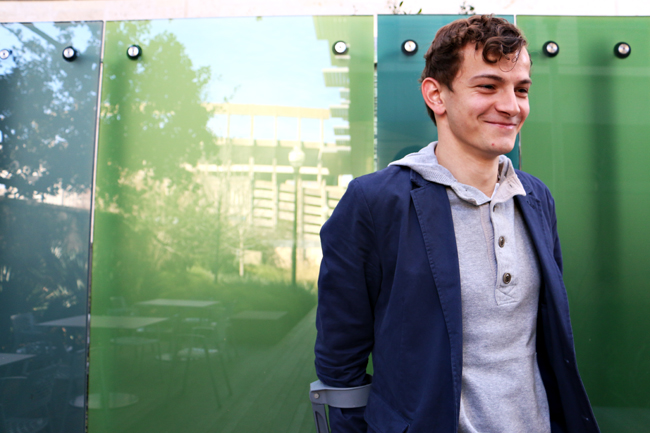Hiking to the top of Africa’s highest mountain, Mount Kilimanjaro, requires immense physical strength — something government senior Alex D’Jamoos, a double amputee who climbed the mountain, knows well.
This past summer, D’Jamoos climbed to the top of Mount Kilimanjaro for the second time.
D’Jamoos’ climb was sponsored by Happy Families International, an adoption agency that attempts to place Russian orphans in American homes so that they can undergo orthopedic treatment. The organization is close to D’Jamoos’ heart because of his own experience as a Russian orphan sent to the U.S. at 15 for orthopedic treatment. Within a year, his host family adopted him and his life in America began.
The summer after his freshman year, D’Jamoos climbed Kilimanjaro for the first time and made it to the third base camp wearing his prosthetics. His second time around, he ditched the prosthetics and crawled his way to the top.
“I wore my ski pants and taped myself all over with duct tape,” D’Jamoos said. “I wore ski gloves and just kind of crawled on the ground. I destroyed my knuckles. They were bleeding after two hours.”
The terrain wasn’t D’Jamoos’ only problem — he also had to contend with a horde of African ants, he said.
“I was being bitten all over,” D’Jamoos said. “I would look on the ground ahead and it was just full of ants, it was crazy.”
These were some of the reasons D’Jamoos hesitated to climb for a second time.
“I thought I would never do it again because it was so exhausting [the first time] and I mean, who does it twice?” D’Jamoos said.
Nevertheless, D’Jamoos did decide to hike the mountain again. For the second trip, Happy Families collaborated with several other nonprofits, each of which sent their own representatives to participate in the climb. D’Jamoos said the increase in fellow climbers made the trip easier.
“It was great to have your friends around to push each other,” D’Jamoos said. “We are all people who share passions. We want to help kids. We want to raise awareness. We all share a purpose.”
In December of 2012, Happy Families International hit a huge speed bump when Russia passed a law banning Americans from adopting Russian children. Senior officials in Moscow said over 40 adoptions in the final stages were halted, according to the New York Times.
“It’s not a very logical situation,” D’Jamoos said.
In response to the bill, D’Jamoos created a Facebook page called “Orphans Without Borders.” The page allows families to share photos, write to each other and talk about anything related to orphans or adoption. Orphans Without Borders has over 2,800 Facebook “likes” and ultimately works to provide a forum for those who believe in orphaned children’s right to a family.
“Whenever you have a child living in an orphanage, and that child has an opportunity to have a family,” D’Jamoos said. “As long as the family can prove in court that they are capable of taking care of the child, then I think the color of their passport is the last thing that matters.”
D’Jamoos’ passion for international adoption is reflected in the scope of his accomplishments.
“It is an interesting experience, to push yourself as hard as you can,” D’Jamoos said. “You learn a lot about yourself in the process, how you handle stress and how you handle exhaustion where even holding a water bottle is impossible.”




















